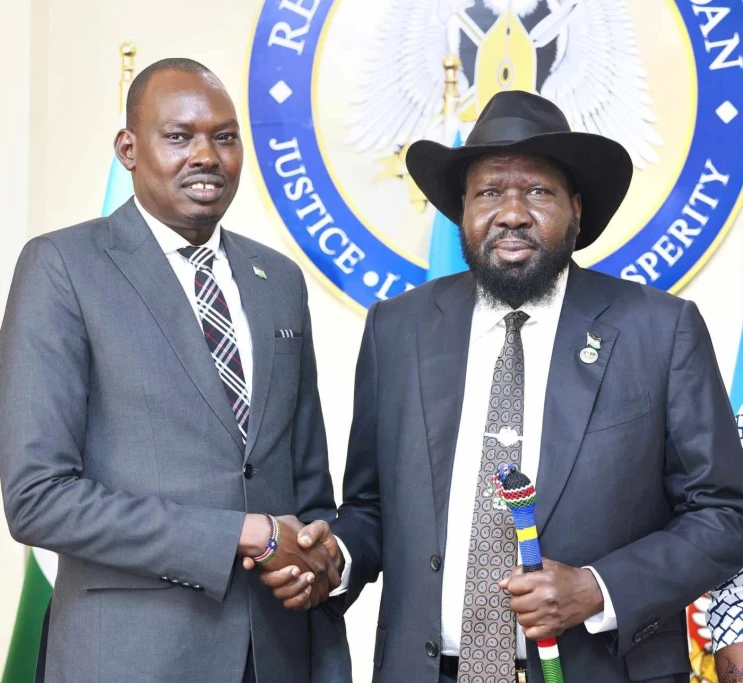
The newly appointed minister of Finance and Planning has initiated his economic reform agenda as instructed by President Salva Kiir.
Since the formation of the Revitalized Transitional Government of National Unity in 2020, at least six ministers have been sacked in the four-year period in search of an economic savior.
Dr. Marial Dongrin
replaced the latest ex-minister, Awow Daniel, barely four months after he took
office.
“Allow me to
first congratulate you on your appointment into this very hot seat. I'm saying
so not to scare you off, but just to remind you about how difficult at this
time being a Minister of Finance. But we all believe in you.” said Malual Tap,
first undersecretary for Finance at the minister's reception on Monday.
During
Dongrin’s swearing-in ceremony, Kiir explained the reasons why he keeps
replacing finance minister.
“I am
looking for a solution, this is why I bring somebody today and tomorrow I kick
him out and bring another person. It is everything that I have tried,” Kiir
revealed.
“When I
succeed in getting the right person, I will hold him firmly and will not let
him go. So, I will tell him to continue working.”
As he
continues to search for the right person, Kiir directed Dr. Dongrin to clear
the salary arrears for the civil servants, increase collection of non-oil
revenue, and consolidate all government bank accounts to address mismanagement
of government resources, which he said are being diverted by individuals.
The minister
commenced the task by outlining the measures to meet Kiir’s demand.
“Ministry of
Finance and Planning will revise upward and issue, by the end of this week, a
new revenue target for the Fiscal Year 2024/2025,” he announced.
“In order to
achieve the new revenue target, the [National] Revenue Authority (NRA) will
provide daily revenue collection reports in order to track progress and address
any impediments in a timely manner.”
According to
the new minister, the NRA board and management will immediately formulate and
execute strategies to achieve the new target, which he will announce later this
week.
The ministry
will also enforce strict implementation of the ministerial orders, suspending
all non-statutory exemptions.
In response
to President Kiir's acknowledgement that the country possesses resources but
that these monies are being mishandled and redirected to accounts other than
those belonging to the government, Dr. Dongrin requested cooperation from the
Bank of South Sudan to consolidate the government's accounts.
“The
Ministry of Finance and Planning requests the Bank of South Sudan to provide a
list of all government accounts at Central Bank and Commercial Banks with
corresponding signatories. This information, once provided, shall form the
basis for implementing the President's directive on the consolidation of
government bank accounts,” Dongrin requested.
In addition
to consolidating government accounts and enforcing taxes, the minister stated
that the government will cut back on spending, try to live within its means,
and manage the limited resources wisely, just like an ordinary household during
lean times.
“The
necessary pain and sacrifices required to get out of this difficulty shall be
equally borne by all, and that will include cutting non-priority public sector
spending. This will ease pressure on and direct resources towards facilitating
the recovery program that we shall roll out soon,” he said.
Much as the
new minister is promising economic recovery through the measures he will be
undertaking, the Commissioner General of the National Revenue Authority,
Africano Mande, said during the reception of the minister that South Sudan’s
economic problem is systemic and not who occupies the docket of the finance
ministry.
“Our problem
is a systemic problem. Some of them are beyond South Sudan, but what is so
important is for system, policies, and institutions to be put in place so that
we are able to pick up form there,” said Mande.
The system
lacks transparency, accountability, and a strong institution.
“What is
happening now is that people have multiple bank accounts, and the money being
collected does not come to the government’s coffers,” President Kiir claimed.
However,
Kiir never provided an explanation for why his administration does not hold
those accountable for diverting collected income from government accounts.